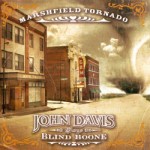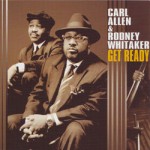Column Name
Title
Marshfield Tornado: John Davis Plays Blind Boone (Newport Classic NPD85678)
Body
For those unfamiliar with John William “Blind” Boone (1864-1927), this superb recording by Juilliard alum John Davis will be a revelation. Boone’s mother, an army cook and former slave, and his father, an unidentified white bugler, had a wrenching decision to make: six months after the infant’s birth in Miami, Mo., Boone contracted opthalmia neonatorum (neonatal conjunctivitis), requiring his eyes to be removed and eyelids sewn shut. (He later said he regarded this as a blessing, forcing him to focus on his musical gifts.) Uncommonly talented, he mastered the tin whistle and harmonica at age 5, and later in his career, pulled stunts like juggling three melodies simultaneously—using each hand and his voice—all in different keys. Eventually a wealthy former slave, John Lange Jr., helped Boone deliver acclaimed performances and publish his works, most of which are virtuoso ragtime salon pieces fusing European concert music with rural American and black folk traditions.
It should come as no surprise that Boone’s favorite composer was Franz Liszt; this is particularly evident in the flowery arrays of the three delightful Caprices de Concert, two additional concert waltzes, and the dazzling opener, Sparks: Galop de Concert (1894). But there’s more. Note his accents and extra beats that create off-kilter rhythms in Camp Meeting No. 1 (1912), worthy of Charles Ives. Some unexpected oases of simplicity include Serenade: Song Without Words from 1887, with its unexpected pentatonic arpeggios, and The Hummingbird (1880), a breezy exploitation of the piano’s higher registers. Another highlight is Old Folks at Home: Grand Fantasie (1894), in which Stephen Foster’s “Swanee River” generates variations swimming with ornamentation.
Davis’s bravura technique and grand style have been lovingly caught by engineers Al Houghton and David Smith, making it easy for listeners to conjure up images of rustling parlor curtains on a Kansas City summer night. The “enhanced” CD—pop it into a computer—includes an eight-minute film by Joan Grossman called Music Miner, with Davis recalling his early exposure to much of this music, and the racier Prohibition days in Kansas City’s 18th-and-Vine district, a neighborhood packed with jazz and blues clubs. This recording should go a long way toward raising the profile of one of Scott Joplin’s most imaginative contemporaries.
Carl Allen and Rodney Whitaker: Get Ready (Mac Avenue, MAC 1034)
From the very first track, La Shea’s Walk, drummer and Juilliard’s new artistic director of jazz studies, Carl Allen, and bassist Rodney Whitaker find an elegant groove in their new collaboration, Get Ready. Steve Wilson soars on saxophone and Cyrus Chestnut brings his piano wizardry to this infectious strut, one of four compositions by Allen, followed by the title track by Smokey Robinson, who would be delighted with its gentle heat, thanks to fine details from Chestnut and guitarist Rodney Jones.
Whitaker takes the spotlight in Marvin Gaye’s Inner City Blues, adding torrents from Wilson, who also stands out in the graceful chorus of Desperate Desire with organist Dorsey “Rob” Robinson. Organ timbres can be difficult to capture truthfully, but engineer James Farber gives Robinson and the rest of this sextet a warm, crystal-clear soundstage with luminous transparency.
Jones mixes in some subtle Latin flavors for Allen’s Alternative Thoughts, and then the tempo takes a swift kick up with Whitaker’s Summer (The Sweet Goodbye), showing these musicians at their most alert and eloquent, anchored by Allen’s crisp rhythmic grid. A haunting ostinato opens Preference of Conviction, with Robinson’s organ in faint gospel howls in the background. Wilson’s dusky plumes appear again for A Heart Enflamed, A Soul Enchanted (also penned by Whitaker), and Kyle David Matthews’s moving, hymnlike We Fall Down. The strikingly chromatic Now Silence completes the program, with saxophone and guitar vying for attention in peppy optimism.
Allen and Whitaker have been working together for more than 20 years, and this generous disc (70-plus minutes) is undiluted pleasure. As Allen writes, “Rodney and I both grew up playing in the church, playing James Brown, Temptations, all of that stuff.” Take that closeness and mutual admiration, add in four more brilliant musicians and you have, as Bill Mikowski says in his liner notes, an “extremely copasetic gathering.”






